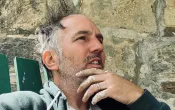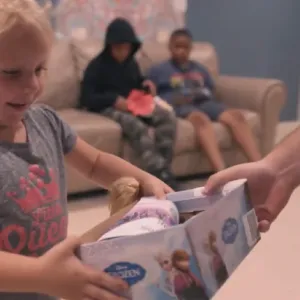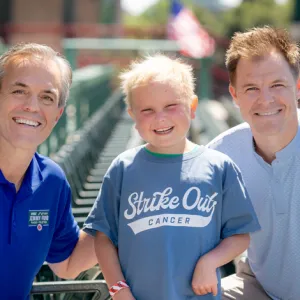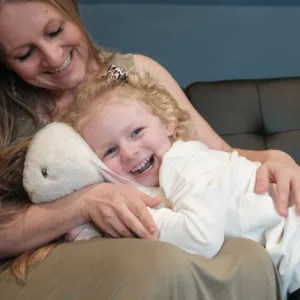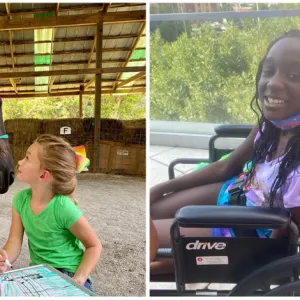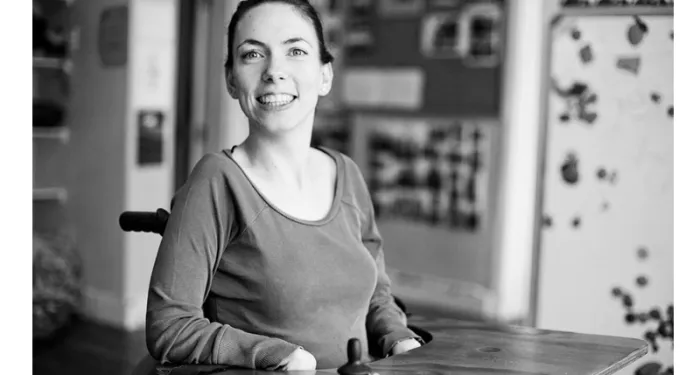
Michaela “Chaeli” Mycroft
How to Turn Adversity Into Opportunity
Michaela “Chaeli” Mycroft of Chaeli Campaign will change how you think about disabilities and show how personal struggles can lead to great things.
We speak with two guests: Michaela, who goes by "Chaeli" (pronounced "kay-lee"), and her mom, Zelda Mycroft. Chaeli was diagnosed with cerebral palsy when she was 11 months old — and has spent every day since living a life that defies expectation.
Chaeli's Campaign for herself and others
Chaeli's lived her entire life in a wheelchair. But that hasn't stopped her from completing ultramarathons, climbing Mt. Kilimanjaro, and competing in international dance competitions.
Her achievements serve many purposes, including:
- Raising funds and awareness for the work of her nonprofit, the Chaeli Campaign. What began as a small effort by schoolgirls (the oldest among them was 12 years old) grew exponentially. Today Chaeli's group provides the funds for therapy or assistive devices for thousands of children.
- She's changing the conversation about what it means to be "disabled." A great quote from the organization is: physical or intellectual impairment is self-evident and can be dealt with, but "disability" is created by the way society responds to the impairment.
The Chaeli Campaign began in her home country of South Africa. But the organization is growing quickly, and recently established a Foundation in the U.S.
FRANK BLAKE: Welcome Thank you very much, Chaeli and Zelda for being with us.
ZELDA MYCROFT: Our pleasure.
CHAELI MYCROFT: Thanks, Frank.
FRANK BLAKE: So, Chaeli, I want to start with a question that isn't so much related to the campaign but to you. The extraordinary things you've done include a 56-mile trek through some of the hilliest terrain in South Africa. Ultra marathons. Summiting Mount Kilimanjaro. Competing in international dance competitions. How do you decide to take on these challenges?
CHAELI MYCROFT: I think I don't always know how I get into these situations. But I think it's about saying yes to things. I've always been raised to see my disability not as a barrier, but as an opportunity to do things differently and to kind of educate people about how they can also do things differently if they want to. I get to bring disability into the more mainstream parts of society. And I am very lucky to have had these experiences and to have had the expectations placed on me that I do actually get involved in, in life, and not just sit around and wait for it to happen to me.
FRANK BLAKE: Well, it's an extraordinary example for anyone. I mean, really, really amazing. And Zelda, let me ask you. What as a parent when you look back on Chaeli's childhood, did you see this always in her or has this surprised you along the way?
ZELDA MYCROFT: Well, Chaeli was diagnosed with cerebral palsy when she was 11 months old.
FRANK BLAKE: 11 months.
ZELDA MYCROFT: And I think that was a great thing because we never ever saw her from birth as a person with a disability. She was always our perfect child. And then she just had some challenges on top of that. And I think is that not what happens with every parent? We see the potential in our children and we've raised Chaeli to always believe that anything is possible. It might just take longer to accomplish something and she might have to find a unique way of doing it.
I'm a former teacher as well as an educator. So the whole educational component of Chaeli living her life as a communication bridge, getting people to ask the questions that they didn't know about her impairment or how she lives her life, and then allowing that kind of dialogue to bring people onboard as potential team members in her creating a special form of independence, which is an independence within a team. So that's pretty much been our philosophy.
FRANK BLAKE: That's very interesting. You mentioned the wheelchair. And Chaeli, since your diagnosis, you've spent your life in a wheelchair starting with the manual wheelchair that needed to be pushed. And we're going to talk later about the campaign on motorizing the chair. But what was it like growing up in a manual chair?
CHAELI MYCROFT: I think that's a difficult question to answer. I've always been a disabled person. My whole life has been as a disabled person. And so I don't really have anything to compare living in a wheelchair to, so that's just how I understand the world. And so I think for me, living my life in a chair is normal. I think obviously there are challenges when you're not able to move yourself to where you want to go. That can be frustrating.
I think a good example to kind of illustrate is that we were traveling recently and I wasn't able to get my motorized wheelchair. And so I was in a regular chair for the time that I was in the airport, and I think my mom always says that when I'm not in my motorized chair and I'm in a regular wheelchair, that my personality changes. And I kind of become super introverted.
So having that taken away, I think, is very difficult. And so I think growing up, I only got my motorized chair when I was nine years old. So up until that point, I was relying on other people. And I couldn't fully express how I felt or what I wanted to do. Because it was dictated by other people. I couldn't be dramatic and leave the room. And I can now.
ZELDA MYCROFT: And she does.
CHAELI MYCROFT: I can't slam doors, but I can flounce dramatically.
FRANK BLAKE: That's great.
CHAELI MYCROFT: I think people underestimate the power of a chair to empower people to be their full selves.
FRANK BLAKE: So, take us back to the moment where this idea first came to you, Chaeli, and what were the five of you doing and how did you decide that you could actually raise the money?
CHAELI MYCROFT: So, I think people think that we had this aha moment. This is what we can do. But I think everything in our journey up to this point has been very organic. And it involved a lot of people. So, I went to the wheelchair shop, I guess, and to fix a seat or something and they had a motorized wheelchair there that was my size.
Which was not really the standard. We had never seen them that small before. And so you always had to import them and it was really expensive. It's okay. We'll wait. And then I got in it. They were like, "Do you want to give it a go?" And I said, "Yes. Thank you." And I did it and I didn't injure anybody. So that was good.
And then I kind of realized, I was like, "I need this in my life!" But we couldn't afford it. So, the manager at the store, Martha, she said, "Well, why don't you sell cookies and things to raise the money?" And we sat with that for a day or two and then I went to my sister and our friends, Jessie, Tarryn and Chelsea and we kind of brainstormed together what we would do. And we figured that selling things was the easiest. We were ready to be in it for the long haul. It's going to take us three years, but we got it!
FRANK BLAKE: Three years, you thought.
CHAELI MYCROFT: Well, I don't know. You prepare for the worst. And so we were ready to wait a while. And I guess we also wanted to be economic about things. And so we sold cards for three rand (South African dollar), which I don't know what that is.
ZELDA MYCROFT: Like $0.25.
CHAELI MYCROFT: And so three rand for a card. But we were like, "If you want an envelope, you got to pay extra."
FRANK BLAKE: Already an entrepreneur.
CHAELI MYCROFT: But we managed to raise the money in seven weeks, and that was amazing that our school got super involved. And our community got involved. And that was an amazing show of what people can do when you come together for a common purpose. Yeah. And now 15 years later, here we are.
ZELDA MYCROFT: After Chaeli got hers, we got the children together and said, "Look, do you want to continue growing this?" And they said, "We do." And we then said that, "If you want to continue growing this, we have to formalize it as an NPO. And on the proviso that the five of you remain involved in continuing to grow what you started."
So the girls were between the ages of six and 12 at the time of founding the organization. And from that time, they have come to every management committee meeting every quarter. And as they turned 18, each of the girls now sits as a fully fledge board member. So their legacy is not in having started it. But Tarryn Terry who was the 12-year-old 15 years ago, she's now our current board chairman. And all of them serve on the board.
ZELDA MYCROFT: Chaeli said additionally they thought they were in it for the long haul. They are!
CHAELI MYCROFT: Yeah. They're still here.
FRANK BLAKE: So that's truly the crazy good thing for others part of this is having successfully done it. Turning your focus to helping others. Was that just absolutely clear and dominant? What was your thought process? This is for either of you really.
ZELDA MYCROFT: Well, I think that being an educator is well, once again, coming back to the educational impact of something like this on your children's lives. From the get-go, we always said to Chaeli, "You have got so much going for you. That you have a responsibility to pay it forward. You are a bright kid. You've got a supportive family. You've got a circle of friends who are supportive. And you now have the responsibility to go and do it for others." And to just get others to understand. So I think that was part of it.
FRANK BLAKE: And Chaeli, did you just say, "Of course, that's right"? Or did you think, "Well …"
CHAELI MYCROFT: But I also think that it's important to mention that sometimes it's okay for things to start off with a selfish goal. Our entire purpose in the Chaeli Campaign, in the beginning, was entirely for me. And then we were like, "Cool. We'll be done after that."
"People always think that you always need to be this selfless person in order to make a difference. And I think that we actually need to acknowledge that sometimes things start off selfishly and they grow into these beautiful things that you can share with other people." - Chaeli Mycroft
FRANK BLAKE: Well said. So, the Chaeli Campaign has grown just tremendously in the years since it started. You now are in the US as well. Tell us about the growth and what are some of the things you've achieved along the way?
ZELDA MYCROFT: Well, we actually run four nonprofit organizations because we've had to diversify because people, funders, don't really see the big picture that we see it.
CHAELI MYCROFT: Yeah. We're a little bit confident.
ZELDA MYCROFT: Yeah. So we're very holistic in our approach. So we, in 2010, we had to start a second NPO called the Chaeli Sports and Recreation Club which focuses on adaptive sports here in South Africa. And then two years ago, our arts and culture program which had generated four professional theater productions based on the work that we do, could no longer get funding because our sole focus isn't the arts. So we then started the Inclusive Arts Collective.
Then in 2017, through meeting up with an amazing adaptive athlete from Philadelphia, we then investigated starting the Chaeli Foundation from Philadelphia, where Jean Altomari lives. And I think that sometimes … You know, often people find a home in foreign places. If that sounds crazy.
And I think our maverick African messaging really resonated with Jean. And I think that she also felt a little bit of that urgency and that, hey, we can do anything. We're not overregulated.
ZELDA MYCROFT: So we're kind of Richard Branson kind of people. And I think that resonated with Jean.
FRANK BLAKE: So the next thing is for Chaeli to go into outer space.
CHAELI MYCROFT: Oh no. No, no. I'm perfectly happy on the planet. I think we just need to save the planet we live on.
ZELDA MYCROFT: Yeah. So Chaeli, maybe you want to speak about the two projects that were launched this year with our recent visit and with the Mexico thing.
CHAELI MYCROFT: Are you talking about the summit?
ZELDA MYCROFT: Totally.
CHAELI MYCROFT: Okay. Just got to be clear. So, our US foundation focuses a little bit more on adaptive sports, but also our first big project was taking an intercontinental delegation to the 17th World Summit of Nobel Peace Laureates in Mexico. That was amazing.
To bring young people into that space from very different perspectives, very different backgrounds, coming together and actually creating a family in that space. The summit is phenomenal. We, as young people, get to sit in spaces where there are Nobel Peace laureates and speak to them and ask them things and argue with them.
CHAELI MYCROFT: So that was awesome. I'm very excited to take another group next year. I think it's also about being open to opportunities that arise. Because if we 15 years ago said, "No, no. We're just going to be doing assisted devices and that's okay," I think we have to be open to the opportunities that life offered us.
And we also have to recognize that life is about it's about everything. It's not about just having one thing at a time. It's about how we engage with the world and how the world isn't designed for disabled people. So we have to fight on all platforms, in all areas, to actually have people with disabilities have equal access to the rights that we have on paper.
ZELDA MYCROFT: And I think the important thing is we don't deal exclusively with people with disabilities.
CHAELI MYCROFT: Because that's not inclusion.
ZELDA MYCROFT: Yeah. So that's exclusion. And also most of the work around inclusion needs to happen with supporters. Nondisabled supporters. And our program, our Ambassadors Program, which is a leadership through social entrepreneurship program. We launched our first USA chapter at the Nobel Peace Summit with a group of scholars from Kingston High School in Upstate New York. And these young people, we've just been up to New York to see them as well a week ago.
CHAELI MYCROFT: Yeah. Shout out to those guys.
ZELDA MYCROFT: Shout out to Kingston High.
CHAELI MYCROFT: Yes!
ZELDA MYCROFT: And also spend some time with Rhinebeck High students as well. And we're hoping to implement our second chapter at Rhinebeck High. But the importance about that is looking at how we can use … We don't call Chaeli a disability activist. We call her an ability activist, as well as all of us. We're all ability activists, because that's what we choose to focus on.
And bringing in leadership through social entrepreneurship which is the way in which the Chaeli Campaign was started, as a vehicle for leadership training, social leadership training, activism training, with and using ability and disability rights as a springboard to speak about additional rights. Because sometimes someone like Chaeli who has a visible impairment is just such a wonderful catalyst to unpack so many other conversations around different forms of prejudice.
FRANK BLAKE: As part of this conversation, I asked both of you to describe for our listeners maybe some of the ways your work has changed life for the disable in South Africa or in elsewhere. Around the world.
ZELDA MYCROFT: Just in addition to what we're speaking about with our Ambassadors Program, this is for children between the ages of nine and 17. And we have got three of our ambassadors who started the organization-
CHAELI MYCROFT: They're under 16.
ZELDA MYCROFT: They're under 16 years old. And I think that is … and they've got their own passions. They're focusing on things like Earth Warriors. There's one of our ambassadors who has two brothers who have impairments. She started an organization called Raising Hope SA and she has a junior board supported by her mom. And their focus is ability and inclusion as well. We run our own inclusive preschool here in South Africa and we also have a huge therapeutic outreach into the poorer communities.
ZELDA MYCROFT: Specifically, looking at children with disabilities and their families and how we can support them.
CHAELI MYCROFT: Yeah. I think one other powerful way that our advocacy and our activism is actually changing on how people understand disability through the Comrades Marathon and the advocacy that we had to do to actually have that happen.
We entered and we got excited, and we paid and we were planning our road trip. And then our partner sent a message, "Guys, did you read the rules? Actually, wheelchairs are not allowed in this race." And so we kind of just didn't accept that as tolerable. And luckily for us, in South Africa, we have a very good constitution that is a very human rights-based. And so we were lucky that we had that legal basis to argue that actually the only reason you're excluding me is because of my disability and that's not allowed.
And we had to advocate and fight with the organizers to actually allow myself and my athletes to be allowed to enter the race. We were very determined to do it either way. So we were going to run unsanctioned if they continued to say no. But I think what is also powerful in that experience and in that story is that in the first year that we did it, people were very confused. There wasn't really that much support for us being there.
ZELDA MYCROFT: But Chaeli that's also because we had to serve legal papers on them for you to enter.
CHAELI MYCROFT: We were not their favorite people. But now we're going into the fifth year of doing it and last year, and it changed completely. Sometimes it takes a while for people to get onboard with what's happening. And sometimes you have to just keep going. Because it was very intimidating in the beginning because we knew that they were watching us. And very blatantly watching us to see if we did anything against the rules so that they could say that we broke them.
Sometimes you have to be persistent and people get onboard. And sometimes it's just about having a conversation.
FRANK BLAKE: That's a great example of change. And now presumably they're quite proud of it.
CHAELI MYCROFT: Yeah. Now. It only took us four years to get there.
ZELDA MYCROFT: But Chaeli, I also think to, two outstanding spinoffs of serving legal papers and fighting in 2016. The first is that the rules of Athletics South Africa have been changed to incorporate a section on wheelchair athletes in road running. So that is a nice, tangible shift that was only created through our advocacy. And then the second thing was after fighting with the Comrades Marathon organizers in 2016, in 2017, Jean Altomari wanted to enter as a self-propelled wheelchair athlete from Philadelphia. She was told no. She contacted us and we then advocated on her behalf to get her to be the first self-propelled wheelchair athlete.
CHAELI MYCROFT: To finish.
ZELDA MYCROFT: To finish. So that was the second moment in history. But it's that advocating around her doing the Comrades that led to the founding of the Chaeli Foundation USA. So sometimes you have to just bite the bullet.
CHAELI MYCROFT: Bite the bullet.
ZELDA MYCROFT: And we believe sometimes you have to tickle with a feather. Sometimes you have to beat with a stick.
That was our beating with a stick moment.
CHAELI MYCROFT: Let's just say she was helpful for that.
ZELDA MYCROFT: Yeah.
FRANK BLAKE: So a question for both of you. What do you think the future holds for the Chaeli Campaign and all of the associated activities?
CHAELI MYCROFT: World domination. [Laughs]
ZELDA MYCROFT: Pinky and the Brain.
CHAELI MYCROFT: I think … I don't know. I think as activists, I remember I went to something, and the one discussion was: How do we work ourselves out of a job? And that's amazing. If we can work ourselves out of a job when you don't need to actually be an activist because everybody has access to everything and their rights are all respected and stuff, I think that would ultimately be amazing.
FRANK BLAKE: What a wonderful answer.
CHAELI MYCROFT: I don't know if we're going to get there in our lifetimes, but you know, it's a good thing to kind of aim for.
ZELDA MYCROFT: You aim high and get as close as you can. And I think just a spinoff of your comment, Chaeli, world domination, I'm actually with that. I'm with you on that one. I would say that it's changing the world one conversation at a time. Because you might not change the world in numbers, but you're changing one person's world at a time.
Whether it's changing the perception of ability in one person, whether they be a person with an impairment or a normatively abled human, that is the way to go. One of the things that we say is that you can't learn inclusion. You have to live it.
FRANK BLAKE: So if you could pass on one message to our listeners, what would that be?
CHAELI MYCROFT: Just one?
ZELDA MYCROFT: Edit yourself, Chaeli.
CHAELI MYCROFT: I know. Okay. Mom, you go ahead.
ZELDA MYCROFT: Thank you for passing that difficult one to me first. [Laughs.]
I'm going to give it from a mother's perspective. I think that so often mothers feel they take on the full responsibility of a child who has challenges. And I would say to moms and to parents, "Be brave, and let your child be a part of other people's lives and have expectations of other people to get involved."
There's this saying, "It takes a village to raise a child", and I feel that is particularly pertinent when you have a child with various challenges, because it's … you need more than just a mom who feels sometimes that she has to be a martyr. That this is her responsibility and she takes that on as her responsibility.
So let go of your child. Get out of your child's way so that your child can grow a network of people who understand what's needed and who challenge your child, and for your child to become fully integrated in a broader sense with more people in their lives.
We found that in our work that when somebody hits 18 years old and there are many programs that finish for children with disabilities when they are 18. Then they become very lonely and isolated.
So you need to be a resilient parent to grow a resilient child to be able to fit into the world where they can make a difference and be a catalyst for change.
FRANK BLAKE: Excellent. And Chaeli, any one message?
CHAELI MYCROFT: I think that my message is kind of linked to that, I think. So, as a disabled person, I think you can apply this to if you're a normatively abled as well, is that if you have to actually claim your vulnerabilities in a very special way and be open about them. Because I'm lucky in that a lot of my vulnerabilities are very obvious to people because I'm a wheelchair. You can see that I have a situation going on and you're clearly going to have to help me with something. But in the experiences that I've had, I've had to actually become way more vulnerable with how I feel about things. And letting people into my life, in my emotions, and if I want to have an experience, then I need to bring that person into my experience of what we're doing.
And so for example, when I did my first cycle tour, I'm very appreciative that I don't have a helicopter mom who wants to be there every five seconds and help me with everything and wipe my nose and have every possible supply that I could ever need. My mom and my whole family has kind of like let me go into spaces where people don't really know what they're doing. And I have to claim my knowledge of myself. And when I did Kilimanjaro, I went with people who had no previous experience of working with a disabled person. And I think doing that actually opens me up to new experiences and trusting that people are actually capable of rising to support you when you need them. Instead of just saying, "Oh, this is my problem as the person living with a disability. Nobody wants to deal with this drama." But actually I've found that way more people are willing to go on that journey with you if you invite them.
FRANK BLAKE: That is wonderful. So I have one last question out of my curiosity. Maybe impossible to answer. But my curiosity is. So Chaeli, you have earned just an incredible number of awards. The International Children's Peace Prize. You've been named, as you mentioned, a Nobel Peace Laureate in 2012. You won the World of Children award. Last year you were a member of the very first class of Obama Foundation Leaders. Is there one of these that you're the most proud of achieving?
CHAELI MYCROFT: You know I don't think I can say that. Because every award … First of all, I think the awards are all for the work. It's not for me as an individual to raise me up on a pedestal. I think it's about presenting the work that we do and supporting the sort of the mission. But every award that I've received has been at a very particular time in my life. I learned different things from them and I get to have different experiences and different opportunities from all of them in different ways. And so I think having all the awards and having my name on things is very cool.
CHAELI MYCROFT: But I think as an activist, it's important to go into things not to get awards, but to gain experience and knowledge and connect with other people in meaningful ways so that you can continue to do the work that you got the award for.
FRANK BLAKE: That is such the perfect answer. And I have to say it has been such a privilege having you and Zelda, having you on the podcast. You really are such great exemplars of doing crazy good things for others. And one last thing. Where's the best place for our audience in the US to learn about you and help in what you're doing?
ZELDA MYCROFT: Yes. Our website is chaelifoundation.org, and Chaeli spelled C-H-A-E-L-I. So it's chaelifoundation.org. We have a Facebook page that is called Chaeli Foundation USA. And with the same name, Instagram and Twitter.
FRANK BLAKE: Thank you so much. Honestly, this has been one of my most favorite episodes. I am truly awestruck by what you've done. I mean, to think back and think of a campaign to raise money for one motorized wheelchair that you thought might take three years, and to see where you are now. I know you both are very humble about what it took to get there. But what an extraordinary journey. And so much more to do!
ZELDA MYCROFT: Absolutely.
CHAELI MYCROFT: Always.
ZELDA MYCROFT: Thank you so much, Frank.
CHAELI MYCROFT: Thanks, Frank.
There are several moments that stand out, but I think you'll especially enjoy…
- Chaeli's mom Zelda explaining how they raised her to believe she can accomplish anything
- How they reached their first fundraising goal - which they expected to require years — in just 7 weeks
- Why selfish goals are more valuable than you think
- "Sometimes you have to bite the bullet. Sometimes you have to tickle with a feather. And sometimes you have to beat with a stick."
- How to learn and live inclusion
- Why Chaeli continues to pay it forward
